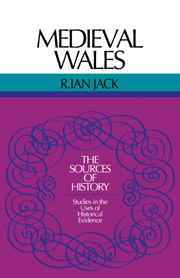Book contents
- Frontmatter
- Contents
- Abbreviations
- General Editor's Introduction
- Preface
- 1 Literary Sources
- 2 The Official Records of Wales and Their Preservation
- 3 The Records of the English Government
- 4 Archives of Individuals and Corporations
- 5 Ecclesiastical Records
- 6 The Antiquaries
- 7 Archaeology and Numismatics
- 8 Cartography and Place-Names
- 9 Conclusion
- Index
2 - The Official Records of Wales and Their Preservation
Published online by Cambridge University Press: 07 October 2011
- Frontmatter
- Contents
- Abbreviations
- General Editor's Introduction
- Preface
- 1 Literary Sources
- 2 The Official Records of Wales and Their Preservation
- 3 The Records of the English Government
- 4 Archives of Individuals and Corporations
- 5 Ecclesiastical Records
- 6 The Antiquaries
- 7 Archaeology and Numismatics
- 8 Cartography and Place-Names
- 9 Conclusion
- Index
Summary
The sources for later medieval English history are dominated by the public records. As the general editor of this series has rightly emphasised, from 1200 onwards the records produced and preserved by the English government give an indispensable and incomparable basis for most kinds of historical enquiry. The enrolled copies of official letters, the complex of writing-department warrants, the difficult but rewarding financial records and the dismaying bulk of legal archives go on in largely unbroken sequence from the thirteenth century to the present day. There is nothing to compare with the English public records anywhere in Europe, not even the papal archives or the collections surviving in Florence. Certainly independent Wales has nothing at all to offer in comparison, and even for the period after the Edwardian Conquest only certain of the records generated in Wales by the various administrations there survive in regular series. Fortunately, there is much in the records created by the English government which has bearing on the history of Wales: but this is a different sort of source, although it shares the same repository with most of the Welsh records. This is because the records produced by the government in Wales were, for the most part, later amalgamated with the English public records, often, moreover, in a thorough way which disguises from the modern student the archival origin of the materials he uses in the Public Record Office.
- Type
- Chapter
- Information
- Medieval Wales , pp. 47 - 78Publisher: Cambridge University PressPrint publication year: 1976



